The 2020 Mac Mini Unleashed: Putting Apple Silicon M1 To The Test
by Andrei Frumusanu on November 17, 2020 9:00 AM ESTBenchmarks: Whatever Is Available
As we’ve had very little time with the Mac mini, and the fact that this not only is a macOS system, but a new Arm64-based macOS system, our usual benchmark choices that we tend to use aren’t really available to us. We’ve made due with a assortment of available tests at the time of the launch to give us a rough idea of the performance:
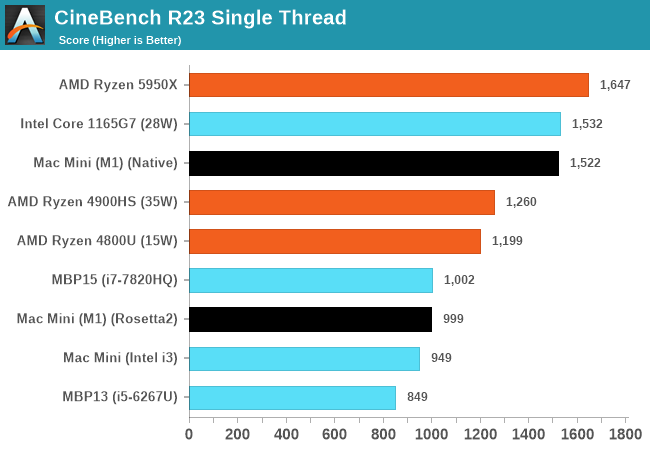
One particular benchmark that sees the first light of day on macOS as well as Apple Silicon is Cinebench. In this first-time view of the popular Cinema4D based benchmark, we see the Apple M1 toe-to-toe with the best-performing x86 CPUs on the market, vastly outperforming past Apple iterations of Intel silicon. The M1 here loses out to Zen3 and Tiger Lake CPUs, which still seem to have an advantage, although we’re not sure of the microarchitectural characteristics of the new benchmark.
What’s notable is the performance of the Rosetta2 run of the benchmark when in x86 mode, which is not only able to keep up with past Mac iterations but still also beat them.
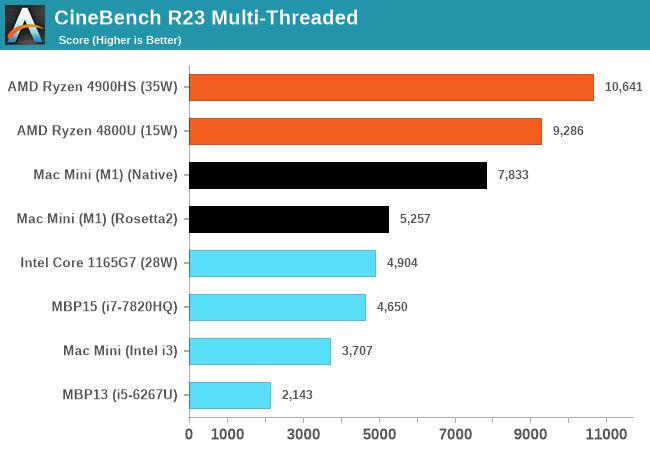
In the multi-threaded R23 runs, the M1 absolutely dominates past Macs with similar low-power CPUs. Just as of note, we’re trying to gather more data on other systems as we have access to them, and expand the graph in further updates of the article past publishing.
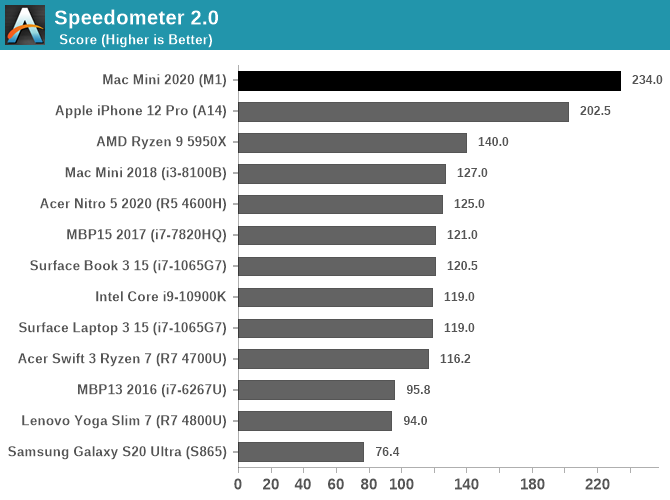
In browser-benchmarks we’ve known Apple’s CPUs to very much dominate across the landscape, but there were doubts as to whether this was due to the CPUs themselves in the iPhone or rather just the browsers and browser engines. Now running on macOS and desktop Safari, being able to compare data to other Intel Mac systems, we can come to the conclusion that the performance advantage is due to Apple’s CPU designs.
Web-browsing performance seems to be an extremely high priority for Apple’s CPU, and this makes sense as it’s the killer workload for mobile SoCs and the workload that one uses the most in everyday life.
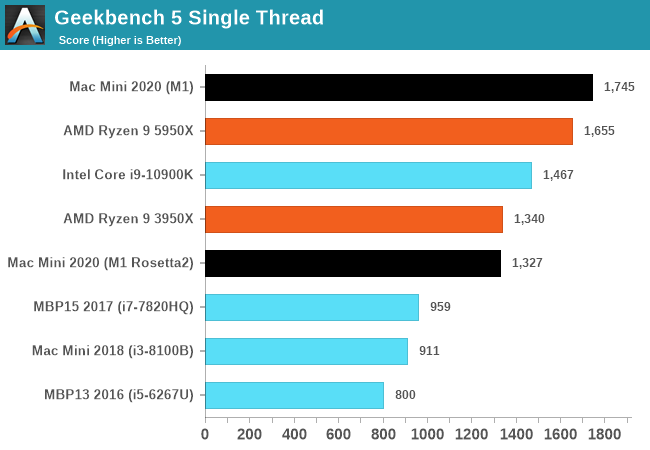
In Geekbench 5, the M1 does again extremely well as it actually takes the lead in our performance figures. Even when running in x86 compatibility mode, the M1 is able to match the top single-threaded performance of last generation’s high-end CPUs, and vastly exceed that of past iterations of the Mac mini and past Macbooks.
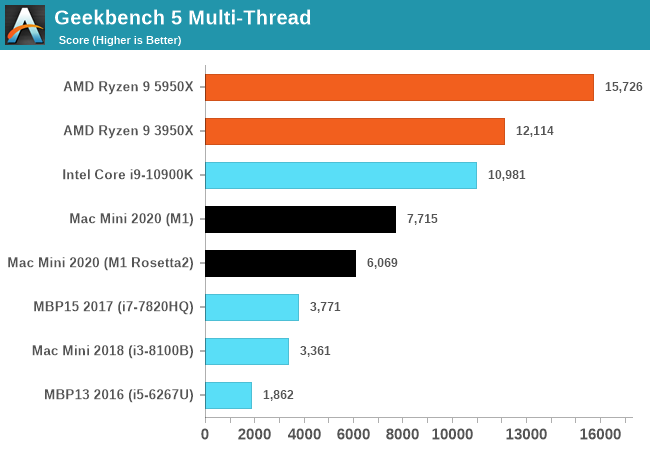
Multi-threaded performance is a matter of core-count and power efficiency of a design. The M1 here demolishes a 2017 15-inch Macbook Pro with an Intel i7-7820HQ with 4 cores and 8 threads, posting over double the score. We’ll be adding more data-points as we collect them.


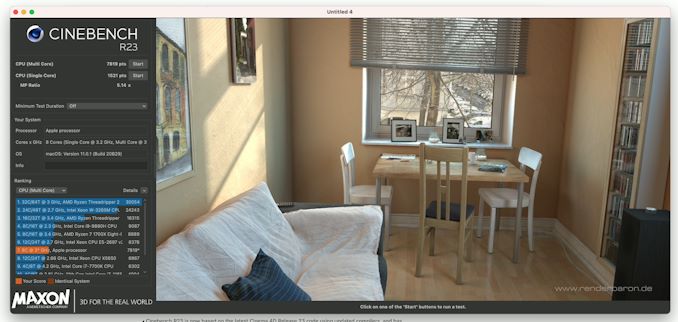








682 Comments
View All Comments
mdriftmeyer - Saturday, November 21, 2020 - link
Threadripper Zen 3 Q12021. Lisa Su and team have already verified.vlad42 - Tuesday, November 17, 2020 - link
It is interesting that they might be working on higher end parts. However, I fear that only companies that are dedicated chip manufacturers/designers such as AMD, Intel, Arm, etc. can financially justify maintaining a sufficient update pace for low volume high end chips due to the fact that they have a much larger addressable market. The costs for those high end parts need to be made up after all.Since people have complained for a long time about the slow update pace for the iMac, Mac Mini, Mac Pro and any other desktop/workstation Mac I may be forgetting, maybe it will not matter?
I wonder if those dedicated high end chips could be a Mac Pro's CPU and GPU?
ABR - Wednesday, November 18, 2020 - link
I'm afraid this is what it looks like. The high end Macs will be updated even less often than they are now and be even further behind – both the lower end models as well as PCs that will be able to use the latest discrete graphics.alexvoda - Wednesday, November 18, 2020 - link
I anticipate that there will be no Apple Silicon Mac Pro.Apple will most probably introduce another M cpu for the MacBook Pro and the iMac simply because this one is capped at 16GB of RAM. It may even be the same chip but clocked higher thanks to the thermal headroom and without on-package RAM.
But I do not think Apple will develop a chip for a very niche product like the Mac Pro. Apple is not SGI. Apple's core market is not high end workstations.
We will probably see the Mac Pro continue to be updated as long as new x86 macOS versions are released and as long as Intel offers something worth updating to.
Or maybe a future Mac Pro will just be a multisocket design with regular iMac CPUs.
colinstalter - Wednesday, November 18, 2020 - link
I would totally agree with you, but they did say that they plan on doing the ENTIRE line. maybe it will just be a chiplette design like AMD. I really don't know, it's hard to imagine them competing in the high-TDP space, but if they say they'll do it i'm sure they will. Their problem will be that that their main strong point is great perf per watt. For the MacPro no one cares about that and just wants the most power possible within a 100-300 watt TDP.jbelkin - Thursday, November 19, 2020 - link
If Apple says 24 months, they mean in about 15, they will be done with the transition. They have already announced the new Mac Pro will be about half the size of the crrent one. The high end Pro market moves the slowest with plugs in and dongles so it makes sense they'll move slower.jbelkin - Thursday, November 19, 2020 - link
Apple owns the high end in laptops (the 1K+ market as the industry counts). 80-90% market share. Macs are about the size of McD's or State Farm, ONLY at Apple can a $25 BILLION dollar business unit be dismissed.BushLin - Thursday, November 19, 2020 - link
"Apple owns the high end in laptops (the 1K+ market as the industry counts). 80-90% market share" [Citation needed] (not really as it's obviously nonsense)Apple's valuation and profits largely come from iPhone sales and services.
MrCrispy - Tuesday, November 17, 2020 - link
First chip?? They've spent a decade designing and building iPhone/iPad SOCs which is exactly what M1 is with a different layout.This is a natural evolution of those. The most impressive part of this is actually Rosetta 2, and Apples's ability to transition the entire line - which comes from having a walled garden and captive developers/users who feed on hype, and not giving a crap about backwards compatibility.
Other companies don't have this luxury.
TEAMSWITCHER - Wednesday, November 18, 2020 - link
I don't see Apple hyping these products anymore than Intel, Nvidia, or AMD are hyping their own products. I do think that Apple delivered silicon that is competitive with what AMD and Intel are selling today, and it's now a three way race. I think that's a good thing.